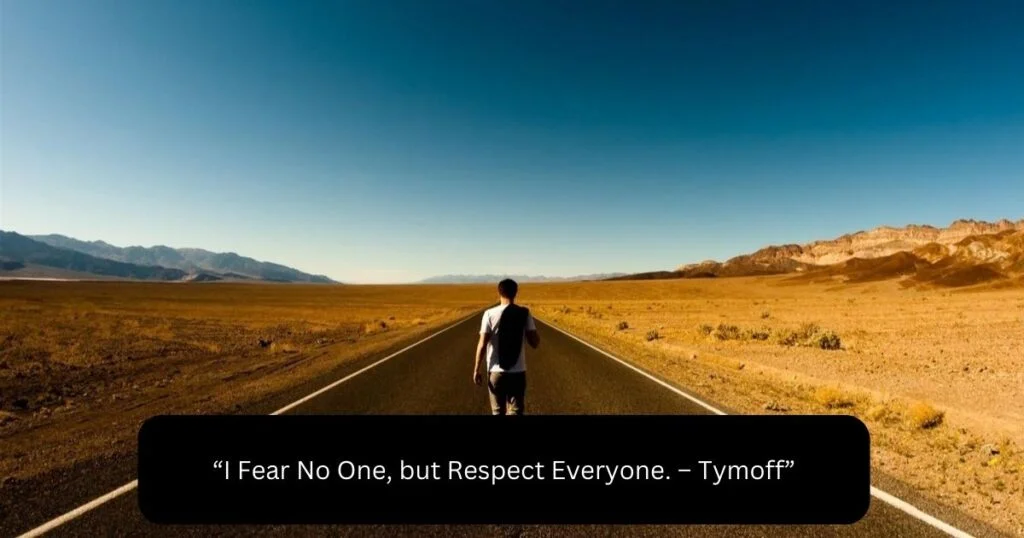In a world where confidence often borders on arrogance and respect can be lost in the pursuit of dominance, the statement “I Fear No One But Respect Everyone. – Tymoff” stands as a powerful reminder of the delicate balance between inner strength and humility. This philosophy isn’t just a phrase; it’s a way of living that promotes self-assurance while maintaining honor and kindness toward others. In this article, we will dive deep into the meaning, origin, and application of this philosophy, and how it can reshape your mindset and interactions with the world.
The Essence of “I Fear No One But Respect Everyone. – Tymoff”
At first glance, “I Fear No One, But Respect Everyone. – Tymoff” may seem like a bold declaration of fearlessness and universal respect. However, its true meaning goes much deeper. It advocates for a mindset where one approaches life with courage but does not let that courage slip into aggression or disrespect. It’s about standing your ground, not through fear or intimidation, but by fostering respect for others.
Courage Without Arrogance
Fearlessness is often equated with invincibility, but in the context of this philosophy, it means having the courage to face challenges head-on without allowing fear to dictate your actions. It’s the kind of fearlessness that comes from knowing your own worth and capabilities while understanding that fear is a natural part of being human. The key is to rise above it without becoming arrogant or dismissive of others.
Respect Without Submission
The respect that this philosophy emphasizes is not subservience. It’s about acknowledging the dignity of others, regardless of their status, opinions, or differences. Respect, in this context, is mutual—it’s not about giving in to others’ demands or agreeing with everything they say, but rather, valuing their perspective even when it differs from your own.
Tymoff: The Origin and Influence Behind the Philosophy
Tymoff, a figure shrouded in both intrigue and influence, has emerged as a modern thinker whose words resonate deeply in today’s fast-paced, competitive world. The origin of the phrase “I Fear No One, But Respect Everyone. – Tymoff” can be traced back to his thoughts on leadership, personal growth, and social dynamics. Tymoff emphasizes the need for balance between self-confidence and respect for others, especially in leadership roles, where power can easily corrupt or alienate.
Leadership Through Respect
Tymoff’s philosophy has gained traction in leadership circles, where respect is often the cornerstone of effective team dynamics. Leaders who operate under this principle command respect through their actions and attitudes, not through fear or domination. They create environments where ideas flourish because team members feel valued and understood, regardless of hierarchy.
A Philosophy for Everyday Life
Beyond leadership, “I Fear No One, But Respect Everyone. – Tymoff” is a mindset that can be applied in everyday interactions. Whether in personal relationships, professional settings, or social encounters, this philosophy can guide individuals to approach conflicts, conversations, and collaborations with a sense of fairness and humility. It encourages open-mindedness, which can lead to more meaningful and productive relationships.
How to Apply “I Fear No One, But Respect Everyone. – Tymoff” in Your Life
Adopting this philosophy requires mindfulness and practice. It challenges the ego and forces introspection on how we treat others and how we react to the world around us. Here are some practical ways to integrate “I Fear No One, But Respect Everyone. – Tymoff” into your daily life:
Develop Inner Confidence
True fearlessness starts with self-awareness. Understand your strengths, limitations, and values. When you have a clear sense of who you are, you become less susceptible to fear and insecurity. This self-assurance allows you to navigate challenges without letting fear control you.
Practice Active Listening
Respect is earned through understanding, and understanding comes from listening. In your interactions, strive to listen more than you speak. Active listening not only helps you gain new perspectives but also shows others that their thoughts and opinions are valued.
Stand Firm in Your Beliefs, but Stay Open to Dialogue
Fearlessness means standing by your convictions, but respect requires you to remain open to the ideas and beliefs of others. It’s possible to disagree with someone while still showing them respect. Engage in conversations with an open mind, and be willing to reconsider your own viewpoints when presented with new information.
Lead by Example
Whether you’re in a formal leadership position or simply interacting with peers, lead through respect. Be the person who treats everyone with dignity, regardless of their position or power. By doing so, you’ll inspire others to follow suit and create an atmosphere where mutual respect is the norm.
Why “I Fear No One, But Respect Everyone. – Tymoff” Is More Relevant Today Than Ever
In today’s hyper-competitive, often divisive world, the philosophy of “I Fear No One, But Respect Everyone. – Tymoff” offers a refreshing and much-needed approach to interpersonal dynamics. Society has seen a growing trend where strength is equated with dominance, and respect is reserved only for those deemed powerful. This mindset, however, leads to a toxic cycle of competition and disrespect, eroding the sense of community and cooperation.
Encouraging Empathy in a Divided World
Respect fosters empathy, which is essential in bridging divides—whether they be political, social, or cultural. When we approach others with respect, we open ourselves up to understanding their experiences, struggles, and perspectives. This understanding is the foundation of empathy, which in turn can reduce conflicts and build stronger, more compassionate communities.
Fearlessness in the Face of Change
Change can be daunting, and fear often accompanies uncertainty. The “I Fear No One, But Respect Everyone. – Tymoff” philosophy equips individuals with the mindset to face change without succumbing to fear. By embracing courage and respect simultaneously, individuals can adapt to change in a way that is not only resilient but also considerate of the impact on others.
Breaking Down Misconceptions About Fear and Respect
There are several common misconceptions surrounding the concepts of fearlessness and respect. Many people view these qualities as mutually exclusive, believing that showing respect is a sign of weakness or that fearlessness implies a lack of concern for others. Let’s clarify these misunderstandings.
Fearlessness Is Not Recklessness
Fearlessness, as promoted by Tymoff, is about calculated confidence, not reckless behavior. It’s not about disregarding risks or acting without caution, but rather, facing challenges with a clear mind and a steady heart. True fearlessness involves being aware of the risks and potential consequences but proceeding with the courage to overcome them.
Respect Does Not Equal Subordination
Some may confuse respect with subordination or deference. However, respect in Tymoff’s philosophy is about acknowledging the humanity and dignity of others. It does not mean placing yourself beneath others, nor does it require you to abandon your own beliefs or opinions. Instead, it means engaging with others in a way that honors their worth as individuals.
FAQs
What is the meaning behind “I Fear No One, But Respect Everyone. – Tymoff”?
This phrase means that one should approach life with confidence and fearlessness, but without letting that confidence turn into arrogance. It encourages respect for all individuals, regardless of differences in status or opinion.
How can I apply this philosophy in my personal life?
By building inner confidence, practicing active listening, and maintaining respect for others’ viewpoints even when you disagree, you can embody this philosophy in your daily interactions.
Who is Tymoff, and why is this philosophy attributed to him?
Tymoff is a modern thinker known for his insights into leadership and personal development. He promotes the balance of strength and humility, which is encapsulated in this philosophy.
Why is respect important in leadership?
Respect is crucial in leadership because it fosters trust, cooperation, and open communication. Leaders who respect their team create a positive work environment where innovation and collaboration thrive.
How does fearlessness differ from arrogance?
Fearlessness is about confidence and courage in the face of challenges, while arrogance is an inflated sense of self-importance. Fearlessness respects others; arrogance dismisses them.
Can I be fearless without being disrespectful?
Yes, fearlessness does not mean you have to dominate or belittle others. True fearlessness comes with a sense of humility and a deep respect for the humanity of those around you.










